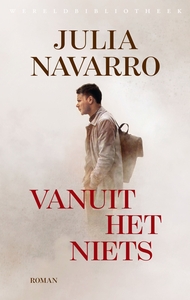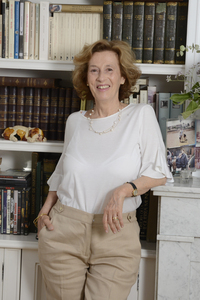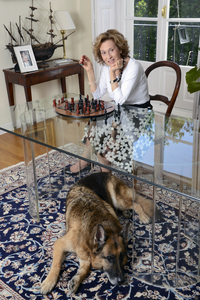Navarro’s achtste roman Vanuit het niets draait om de Libanees-Franse Abir Nasr, wiens ouders en zusje voor zijn ogen worden doodgeschoten door Israëlische soldaten. Abir zweert ooit wraak te zullen nemen. Hij en zijn broertje Ismail komen terecht bij strengreligieuze familie in Parijs, die later naar de wijk Molenbeek in Brussel verhuist.
Terwijl Abirs nicht Noura de vrijere leefwijze van het westen verkiest – en uitgestoten wordt uit de familie –, worden Abir en Ismail door hun oom steeds meer naar de extremistische kant getrokken. Een vernederende afwijzing van Noura’s vriendin Marion en het besef dat hij nooit werkelijk deel zal uitmaken van deze samenleving, zetten Abir ertoe aan om zijn plannen voor wraak in daden om te zetten.

Een andere hoofdpersoon is Jacob Baudin. Net als Abir is hij geboren in Libanon, en als kind met zijn ouders naar Parijs verhuisd. Als op zijn 12de verjaardag zijn vader sterft, vertelt zijn moeder hem dat hij joods is en dat ze naar Israël zullen verhuizen. Daar wordt hij als jongeman een van de militairen die deelnemen aan de fatale missie, waarbij de familie van Abir wordt gedood.
Jaren later wordt Jacob nog steeds gekweld door schuldgevoelens en door de haat die in de ogen van de overlevende zoon te lezen viel. Op de dag dat Abir zijn plan in werking stelt, raken hun levens opnieuw met elkaar verstrengeld.
De aanslagen in Brussel uit 2016 vormden de voedingsbodem voor deze roman, neem ik aan?
‘Zeker, en ook alle andere aanslagen elders in Europa: Barcelona, Madrid, Parijs en Londen. De roman is voortgekomen uit het gebrek aan begrip tussen westerse en oosterse landen. Een van de grootste problemen van deze 21e eeuw is de ontworteling die mensen ervaren nadat ze, meestal noodgedwongen, van het ene naar het andere land zijn verhuisd. Ze hebben moeten vluchten voor oorlog, geweld of andere ellende, en moeten een nieuw leven opbouwen in een andere maatschappij. Hun omstandigheden zijn vaak niet prettig of makkelijk.’
Uw roman legt een vinger op een zere plek: angst voor buitenlanders, met name voor moslims en hun religie, leidt ertoe dat ze nooit écht worden opgenomen in de samenleving en zich dus ook niet werkelijk thuis kunnen voelen in hun nieuwe vaderland.
‘Die vreemdelingenangst leeft in heel Europa. De vluchtelingen komen uit landen met andere gebruiken en normen en waarden, en de ontvangende landen weten weinig van hun achtergrond en kunnen zich daardoor moeilijk met hen verbinden. Het onbekende roept angst op, en dat leidt tot uitsluiting. Dat versterkt de kans dat de migranten zich terugtrekken en zich bijvoorbeeld sterker vastklampen aan hun religie, om zo een gevoel van identiteit te bewaren.
We zouden over en weer meer moeite doen elkaar te begrijpen. Wij in het westen zouden ons meer moeten proberen te verplaatsen in de situatie van migranten, in wat het betekent om huis en haard achter te moeten laten en te moeten proberen te aarden in een land waar geloof, gebruiken en gedrag, en sociale normen en waarden totaal verschillend zijn.’
Globalisering

Ten gevolge van klimaatverandering zal migratie naar verwachting nog veel grotere vormen gaan aannemen.
‘Inderdaad ontvluchten meer en meer mensen vanwege klimaatproblemen hun land, of vanwege geweld. De grootste uitdaging waar de Europese Unie voor staat, is het in goede banen leiden van de globalisering. Landen zijn veel heterogener geworden; er bestaat niet meer zoiets als Nederland voor de Nederlanders of Spanje voor de Spanjaarden. Elk land heeft inwoners uit wel tig culturen. Maar er heerst nu vooral wantrouwen. Onze democratieën zullen een oplossing moeten vinden om op een fatsoenlijke manier te kunnen samenleven.
De publieke ruimte moet een veilige plek zijn voor ieder mens, ongeacht waar je bent geboren. Dus we zullen beter moeten leren samenleven met elkaar en elkaars verschillen. Niet de ene cultuur opdringen aan de andere, maar meer open voor elkaar staan en van elkaar leren, in plaats van te denken dat de ene cultuur superieur is aan de andere. Dat betekent ook dat allemaal dezelfde rechten en plichten moeten hebben, zodat iederéén zich gerespecteerd en gewaardeerd voelt. De veiligheid van de openbare ruimte waarin we met elkaar samenleven moeten we bewaren en bewaken, en dat gaat ons allemaal aan.’
Wat kan literatuur, een boek als het uwe, daarin betekenen?
‘Een roman kan een vraagstuk vanuit verschillende perspectieven te laten zien, en de lezer uitnodigen om even in iemands schoenen te gaan staan en daarover na te denken. Mijn roman gaat over de invloed van geweld, ontworteld zijn, het westen versus het oosten, de rol van de media. Ik hoop dat je daar dichterbij komt doordat je over de geschiedenis van de personages leest en zo misschien heel even in hun huid kruipt. Niet om hun daden goed te praten of medelijden op te wekken, niet om ze te veroordelen, maar om ze te begrijpen. Om te begrijpen waarom iemand zoals Abir, die ingenieur wil worden, eindigt als zelfmoordterrorist.’
Mevrouwtje waarom
Hoe moeilijk was het voor u om zich in te kunnen leven in uw personages? Zij staan nogal ver van u af.
‘Ik ben geïnteresseerd in de mens en dat is waar ik over schrijf, elke roman weer. Mijn grootvader noemde mij altijd ‘mevrouwtje waarom’, omdat ik altijd wilde weten waarom iets gebeurde, waarom iemand iets deed. Ik stelde voortduren vragen. Door mijn werk als journalist heb ik veel verschillende mensen ontmoet, van premiers en Nobelprijswinnaars tot criminelen. Dat heeft me de mogelijkheid geboden achter het nieuws te kijken, een grote rijkdom voor een schrijver.
In mijn werk reis ik door de lichte en donkere plaatsen die in ieder van ons zitten. Ik heb Abirs weg, die begint in Zuid-Libanon en eindigt in Brussel, samen met hem afgelegd. En ik heb geleerd dat er veel is wat we op dit vlak nog niet goed doen in Europa.

Het is niet mijn intentie mijn lezers te vertellen wat ze moeten vinden. Ze hoeven zich ook niet te identificeren met de hoofdpersoon of medeplichtig te worden. Wat ik beoog, is laten zien wat er gebeurt, nu, in onze samenleving. Om de lezer daarover te laten nadenken en zijn eigen conclusies te laten trekken.
De enige persoon van wie ik denk dat lezers misschien een beetje gaan houden, is Noura. Ze betaalt er een hoge prijs voor om baas over haar eigen leven te worden. Voor mij belichaamt zij het moeilijke pad dat vrouwen moeten gaan, en dan bedoel ik niet alleen moslima’s maar vrouwen in het algemeen. Vrouwen hebben hun vrijheid en de zeggenschap over hun leven stap voor stap moeten bevechten; niets is ons geschonken. Vrouwen zoals zij, die het recht willen hebben over hun eigen leven te beslissen, moeten daarin worden gesteund.’
Julia Navarro, Vanuit het niets (384 p.), vertaald uit het Spaans door Marjan Meijer, € 24,99
De Madrileense schrijfster Julia Navarro (1953) werkte decennialang als journalist, en publiceerde enkele boeken over politiek, voordat ze als romanschrijfster debuteerde. In 2004 verscheen haar eerste boek (een jaar later in het Nederlands verschenen onder de titel Het Sindone Complot) en het werd direct een bestseller. Hierna volgden vertalingen van De verborgen kleitabletten, Het bloed van onschuldigen, Zeg me wie ik ben (bewerkt tot de Netflix-serie Tell Me Who I Am) en Schiet maar, ik ben toch al dood. Navarro is een van de grote namen in het Spaanse genre dat ‘thracul’ wordt genoemd, wat staat voor ‘thriller histórico religioso aventurero cultural’, oftewel de historische, religieuze, culturele avonturenthriller.
